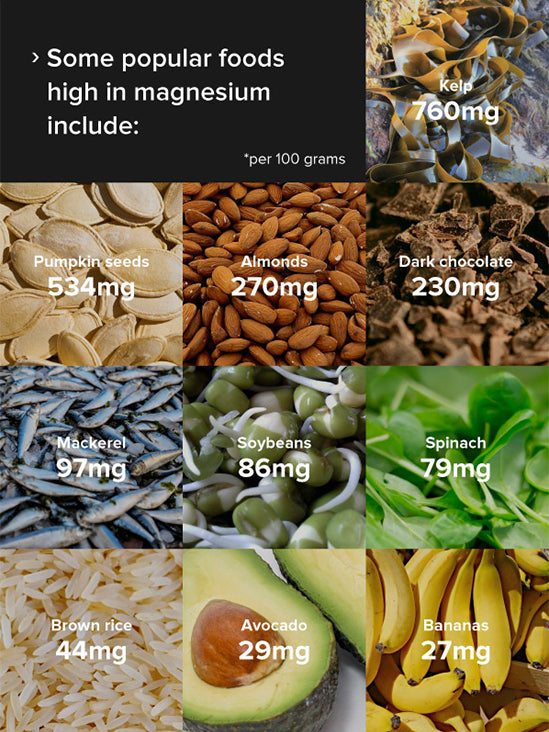Magnesium Supplement Benefits
As a key element in over 600 biochemical reactions in the body, adequate levels of magnesium can result in numerous health benefits.
Primarily acting as a supporting mineral, the availability of magnesium is essential for optimal health.
One of the most important roles magnesium plays is that of helping to create energy for our cells.
The mitochondria inside our cells need magnesium to create energy for in the form of ATP to keep us alive and functioning.
Without magnesium, the nutrients we absorb could not be metabolised into usable forms of energy.
Our cells then use ATP to as their fuel source or energy to carry out other function such as: 3
Cell Reproduction
create new cells and support cell division
Protein Synthesis
create new proteins from amino acids
Muscle Fibre Contractions
contract and relax muscles properly
Gene Maintenance
create and repair DNA and RNA
Nervous System Regulation
regulate messages between brain and nervous system

Magnesium Rich Foods
Magnesium is found in many vegetables, especially leafy greens, as well as in nuts, seeds and legumes. Foods with plenty of fibre are usually high in magnesium.
It is best to always try get as many vitamins and minerals from a healthy balanced diet. The magnesium in food is often absorbed far better than supplements so a small amount may go a long way.
Unfortunately, with the lowering levels of magnesium in our food, even a diet filled with these foods might not be enough for a stressed person, which is where a supplement would be necessary.
Magnesium Supplements
There are many popular forms of magnesium supplements out there. However, some are much better than others. Absorption rates between different types of magnesium vary between 4% and 30% which is why it is always important to check which form is being used.
Recommendations:
Magnesium citrate offers one of the best absorption rates and is reasonably priced. It consists of magnesium bound with citric acid making it water soluble and very well absorbed.5 It is one of the most popular forms of magnesium for supplementation in top quality products.
Magnesium Glycinate is magnesium bound with the amino acid glycine, an exceptionally bioavailable form of magnesium. This type of magnesium is popular as it is less likely to cause a laxative effect while still being well absorbed.6
Avoid the poorly absorbed magnesium supplements such as oxide, gluconate, sulphate and carbonate.
Magnesium Dose Calculator
The amount of magnesium your body requires on a day to day basis is heavily dependant on your size and lifestyle. Use this calculator to get an idea of how much magnesium you should look to consume each day for optimal health.
and
of magnesium each day to maintain optimal magnesium levels.
Magnesium FAQ
-
What does a magnesium supplement do?
Magnesium is a key mineral used in over 600 bodily processes such as muscle regulation, nerve function, blood sugar levels, bone growth, stress control and energy production.
A good, well-absorbed magnesium supplement will ensure your body is not suffering from a deficiency and allow it to optimise over 600 functions.
-
What are the symptoms of low magnesium?
If you have a less than adequate intake of magnesium, it is a risk factor that can cause muscle twitches and cramps, weak bones, fatigue and muscle weakness, high blood pressure, asthma, irregular heartbeat.
You can read more about a magnesium deficiency and what constitutes enough magnesium here.
-
What are the side effects of magnesium?
The side effects of magnesium vary mainly depending on the type of magnesium and how much you take. Other than feeling the benefits of magnesium, higher magnesium intakes can result in an overdose
that may cause loose stool and nausea.An overdose is unlikely to cause harm to anyone with normal kidney function
You can read more about side effects and a possible overdose here.
-
Which foods contain magnesium?
Magnesium is present in many foods but higher levels can be found in kelp, pumpkin seeds, almonds, dark chocolate, mackerel, soybeans and dark leafy greens. You can find more in our magnesium rich food section.
The dietary magnesium in food is often absorbed far better than dietary supplements, so a small amount can be enough to make sure you have enough magnesium.
-
What is the best magnesium dosage?
The optimal magnesium intake depends on individual requirements.
Daily magnesium intake for an average female should be at least 420mg per day and in males 720mg per day. Adjust your dietary magnesium intake based on how your size and magnesium deficiency varies from average.
If you exercise or sweat more than the average person, you may lose more minerals.
If you’re constantly stressed, you need more than the average person.Check out our magnesium dose calculator here.
-
Which type of magnesium should I take?
Magnesium supplements are definitely not all the same. All the different types of magnesium mineral vary in what they’re chemically bound too. Some are more bioavailable than others and offer a second benefit in the bound chemical.
● Magnesium Citrate: A well-absorbed magnesium form. However, it can disrupt the gut at high doses.
● Magnesium Malate: A great magnesium form with slow release.
● Magnesium Glycinate: well-absorbed and easy on the gut; bound to amino acids our body uses.Check out our magnesium supplement buying guide or all the various types of magnesium supplements for more recommendations.
-
Can I overdose on magnesium?
A magnesium overdose would be very rare with the conservative recommendations on magnesium supplements. Most people that consume excess magnesium will excrete it without issues and might know about it with some diarrhea.
Those with impaired kidney function are at risk for a magnesium overdose if they exceed their recommended dietary allowance and cannot process the magnesium. You can read more about a magnesium overdose here.
Magnesium Supplements
We’ve created a magnesium supplement with a combination of thee types of highly absorbable magnesium at a therapeutic dose.
Our magnesium comes as an easy to mix, great tasting powder to ensure optimal absorption. To learn more about our magnesium, check out the product page below.

Magnesium Reviews
To check out the reviews for our Biosphere Magnesium and to find out what people are saying about Magnesium, visit the product page here.


